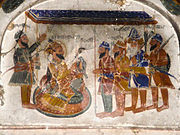Indian philosopher
|
|||||
Indian philosophy refers to ancient philosophical traditions of the Indian subcontinent. The principal schools are classified as either orthodox or heterodox – āstika or nāstika – depending on one of three alternate criteria: whether it believes the Vedas are a valid source of knowledge; whether the school believes in the premises of Brahman and Atman; and whether the school believes in afterlife and Devas.
There are six major schools of orthodox Indian Hindu philosophy—Nyaya, Vaisheshika, Samkhya, Yoga, Mīmāṃsā and Vedanta, and five major heterodox schools—Jain, Buddhist, Ajivika, Ajñana, and Cārvāka. However, there are other methods of classification; Vidyaranya for instance identifies sixteen schools of Indian philosophy by including those that belong to the Śaiva and Raseśvara traditions.
The main schools of Indian philosophy were formalised chiefly between 1000 BCE to the early centuries of the Common Era. According to philosopher Sarvepalli Radhakrishnan, the earliest of these, which date back to the composition of the Upanishads in the later Vedic period (1000–500 BCE), constitute "the earliest philosophical compositions of the world." Competition and integration between the various schools was intense during their formative years, especially between 800 BCE and 200 CE. Some schools like Jainism, Buddhism, Yoga, Śaiva and Advaita Vedanta survived, but others, like Ajñana, Charvaka and Ājīvika did not.
...
Wikipedia




